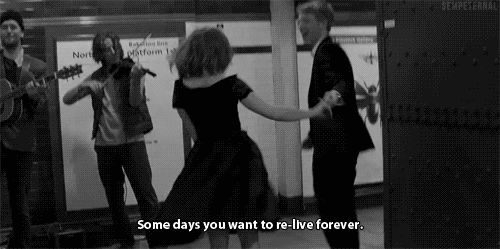2. About Time (2013)
About Time represents a late great addition to the collection, which absurdly continues to grow, despite all evidence that this digital technology is destined to befall the same fate as all things analog. Speaking of ways of the past, About Time is yet another time travel-centric movie co-starring Rachel McAdams as the long-suffering wife/girlfriend, who is blindly kept in the dark and trapped in the present. This categorization is generally a helpful reminder to stay away (i.e. heartbreaking disappointment of The Time Traveler’s Wife based on one of my all-time favorite novels), but in this instance, just the opposite is true. About Time, like life itself, is not always perfect, but the stuff it gets right is sublime.
And there’s plenty this Richard Curtis film gets right. There’s its funny, generous script in which all characters are realized and, for the most part, observed as good and kind people, struggling with their own worries and insecurities, just trying to make it through the day. It also helps that these characters are exceptionally well cast. Domhnall Gleeson is charming as the time-hopping protagonist, Tim, who is rightly described as a man with “quite a nice smile and fun hair.” Bill Nighy is his playful (equally ribbing and loving) father, and the two have great chemistry together. Lindsay Duncan only speaks in blunt truths as his sturdy mother. Lydia Wilson (mischievous sister), Margot Robbie (first crush), and Vanessa Kirby (now famous for playing The Crown’s rebellious Princess Margaret) round out the cast. And lest we forget, the luminous McAdams playing an American in London and once more the time traveler’s wife. After a series of truly awful and emotionally inert romantic comedies, in About Time she’s finally given a project worthy of her talents, which hadn’t been properly applied since a launching pad performance in Mean Girls.
Tim introduces us to his family via first person voiceover (presumably given from his future present), accompanied by a montage of the happy fivesome tea-timing on a Cornish beach and watching projected movies in their backyard. For me, this is classic lifestyle porn stuff. More so than any traditional romance, I found myself falling head over heels for his life in its juxtaposition of the idyllic (tea on the beach! movies al fresco!) and completely ordinary (gardening with mum, ping pong with dad). The day after their famous New Year’s Eve party, Tim’s father informs him that all the men in their family have the ability to travel back in time. He just needs to go into a dark place, clench his fists, think of a place he’s been before, and whoosh, he’s there. A modern C.S. Lewis, Curtis set dresses his film with a magical wardrobe possessing the powers to transcend time and space. Only in British pop-culture do we encounter furniture large enough to fit in! In the end, the film trades magical realism for magic in realism by proclaiming that life’s real miraculousness exists in its little daily joys.
To my mind, characters time-traveling in movies is akin to the horror victim running up the stairs when she should be running out the front door. A certain amount of suspended disbelief is required to maximize enjoyment. It’s best to not get bogged down in the physical particulars or potential butterfly effects. Tim’s father attempts to explain the limitations of their “powers,” but it almost doesn’t matter. The movie is not really about that and trying to spot goofs or poke holes will only do the audience a disservice. It’s best to take the travel for the gimmick it is: An unrealistically romantic narrative device utilized to tell a story about love, not time.
McAdams’ Mary is the self-appointed president of the Kate Moss fanclub - a notable piece of trivia that helps Tim find her again after sharing a memorable chance encounter that is later “erased” when he travels back to fix a different problem. Mary theorizes that, “The magic of [Moss] lies in her history...the informality of her early shots compared to this stuff so you just always know that, despite the high fashion, she’s still just that cheeky normal naked girl on the beach.” As one unfamiliar with the prolific work of Kate Moss (other than that horrible quote about how great skinny feels), I interpret this argument as commentary on the power of shared history as the fundamental foundation of a loving, committed relationship. The magic of Tim and Mary’s love lies in their history and the promise of their shared future. Tim’s travels cannot circumvent consent or make someone fall in love. That kind of commitment, intimacy, and vulnerability requires him to put in the time, and there are simply no shortcuts.
Tim characterizes his as a good childhood “full of repeated rhythms and patterns,” conflating the concepts of routine and actual do-overs. To maximize narrative efficiency and limit redundancy, most of Tim’s travels illustrate him doing things differently or applying a new solution to a familiar problem. By contrast, the film’s two time-lapse-type montages reflect real time passing - moving forward not back - in Tim waiting for Mary to turn up at the Moss museum exhibit and Tim and Mary’s relationship evolving and revolving around their local tube station. Most “flashbacks” sacrifice logic and efficiency for the sake of moving the story propulsively forward, rather than reliving singular days or moments as seen in Edge of Tomorrow or Groundhog Day. There are no resets or respawns in this world. Tim’s journey is one of a ping pong ball bouncing around, back and forth in time.
Many of Tim’s early time travels are played for laughs. The sound designers orchestrate a special time travel noise so you always know when Tim goes back to correct a social faux pas or take a mulligan. Via these “flashbacks,” we get to hear a series of progressively worse best man speeches at this wedding, or see him act a fool in front of his adolescent crush Charlotte, or take several goes at an amazing “first time.” Not all these comedic showcases work for me, but they raise interesting ontological questions and as time passes and stakes are raised, the movie becomes more about the things he doesn’t go back and change.
Quite honestly, I only have two issues with the film. The first being Mary’s inexplicable self-esteem issues, which ring more false than the possibility that patrilineal generations have inherited the ability to travel through time. After all, McAdams is quite possibly the most adorable person to ever light up modern movie screens, and there’s no level of loudly-patterned frocks, brown hair or new fringe that can convince me otherwise. The other is, of course, that only the men in the family are unconstrained by space and time, and that (somehow even worse!) they keep this fact completely secret from their wives. Such a betrayal! Depriving daughters Kit Kat and Posy of such travels and, therefore, this special connection with their own fathers feels profoundly unfair. Other than those nitpicky gripes, it’s about time this movie gets the praise and attention it deserves, and “all we can do is do our best to relish this remarkable ride.” And while I unfortunately lack the ability to travel back in time to fix things (or become an effective online influencer), if I can convince one person to watch this movie instead of the overrated, over-treacly Love Actually, it will have been worth it.







